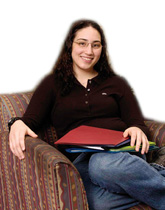
Stephanie Rosenthal stands in front of a group of young students at the Western Pennsylvania School for the Deaf. She’s proudly wearing a button that reads: “I [heart] ROBOTS!” It’s standard gear for Roadshow with Women@SCS.
Although Rosenthal isn’t used to an interpreter signing her words, the Roadshow proceeds similarly to the others she has presented to adolescents throughout her undergrad years as a computer science and human-computer interaction double major. Rosenthal and a few other students lead the programs, which are meant to quash nerdy perceptions about computer science. When the students learn that computer scientists created the animation in the movie Shrek, geeky doesn’t cross their minds.
Although Rosenthal isn’t used to an interpreter signing her words, the Roadshow proceeds similarly to the others she has presented to adolescents throughout her undergrad years as a computer science and human-computer interaction double major. Rosenthal and a few other students lead the programs, which are meant to quash nerdy perceptions about computer science. When the students learn that computer scientists created the animation in the movie Shrek, geeky doesn’t cross their minds.
Not only has the 22-year-old published articles about her findings in computer science journals, but she’s also received several prestigious awards and scholarships, including ones from Google, Boeing, Microsoft, and the National Science Foundation.
Her button doesn’t lie—Rosenthal knows robots are a great tool for engaging students. At the School for the Deaf, she introduces Billinda. Rosenthal explains that the robotic dog moves on her own through the camera in her nose, which reacts to certain visual cues. Pink, she explains, is the one color the dog can see. The children watch eagerly, signing so fast that their teacher tells them to slow down so she can understand what they’re saying.
Rosenthal knows the feeling. During her sophomore year of high school, she saw a similar program on robots. She was a good student in biology and math and loved building things, like the time she helped her dad fix the family computer. When she saw the school presentation, she discovered the perfect blend of her loves. “I didn’t really know what computer science was,” she says, “but I thought robots were cool.”
Now, after spending frequent 12-hour sessions in the Wean Hall Linux computer cluster working on operating systems, surviving on lots of caffeine, Rosenthal is still hooked. Having graduated last May, she is pursuing her PhD in computer science, working on applying artificial intelligence to everyday life.
Through the Roadshows, she’s also become well acquainted with computerized dogs. At this Roadshow, something has gone wrong. Billinda sits motionless. Rosenthal realizes the lights must be too low for Billinda to discern colors, and the noise in the room must be causing sensory overload. Just as she is about to explain the inactivity, Billinda charges toward a girl wearing a pink shirt. “Well,” Rosenthal says, “robots aren’t perfect.” The girl in the pink shirt laughs.



